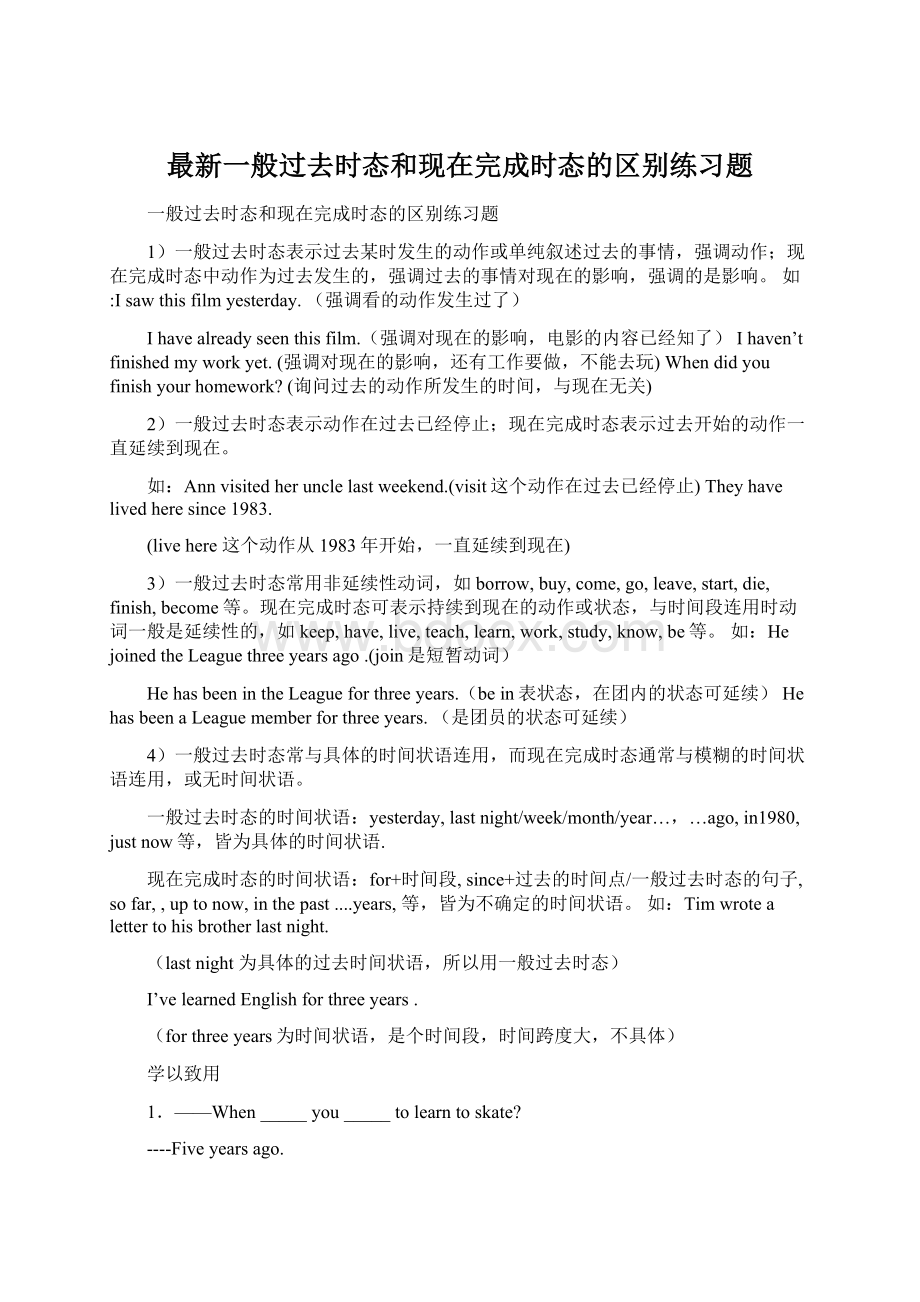最新一般过去时态和现在完成时态的区别练习题.docx
《最新一般过去时态和现在完成时态的区别练习题.docx》由会员分享,可在线阅读,更多相关《最新一般过去时态和现在完成时态的区别练习题.docx(6页珍藏版)》请在冰豆网上搜索。

最新一般过去时态和现在完成时态的区别练习题
一般过去时态和现在完成时态的区别练习题
1)一般过去时态表示过去某时发生的动作或单纯叙述过去的事情,强调动作;现在完成时态中动作为过去发生的,强调过去的事情对现在的影响,强调的是影响。
如:
Isawthisfilmyesterday.(强调看的动作发生过了)
Ihavealreadyseenthisfilm.(强调对现在的影响,电影的内容已经知了)Ihaven’tfinishedmyworkyet.(强调对现在的影响,还有工作要做,不能去玩)Whendidyoufinishyourhomework?
(询问过去的动作所发生的时间,与现在无关)
2)一般过去时态表示动作在过去已经停止;现在完成时态表示过去开始的动作一直延续到现在。
如:
Annvisitedherunclelastweekend.(visit这个动作在过去已经停止)Theyhavelivedheresince1983.
(livehere这个动作从1983年开始,一直延续到现在)
3)一般过去时态常用非延续性动词,如borrow,buy,come,go,leave,start,die,finish,become等。
现在完成时态可表示持续到现在的动作或状态,与时间段连用时动词一般是延续性的,如keep,have,live,teach,learn,work,study,know,be等。
如:
HejoinedtheLeaguethreeyearsago.(join是短暂动词)
HehasbeenintheLeagueforthreeyears.(bein表状态,在团内的状态可延续)HehasbeenaLeaguememberforthreeyears.(是团员的状态可延续)
4)一般过去时态常与具体的时间状语连用,而现在完成时态通常与模糊的时间状语连用,或无时间状语。
一般过去时态的时间状语:
yesterday,lastnight/week/month/year…,…ago,in1980,justnow等,皆为具体的时间状语.
现在完成时态的时间状语:
for+时间段,since+过去的时间点/一般过去时态的句子,sofar,,uptonow,inthepast....years,等,皆为不确定的时间状语。
如:
Timwrotealettertohisbrotherlastnight.
(lastnight为具体的过去时间状语,所以用一般过去时态)
I’velearnedEnglishforthreeyears.
(forthreeyears为时间状语,是个时间段,时间跨度大,不具体)
学以致用
1.——When_____you_____tolearntoskate?
----Fiveyearsago.
A.do;startB.will;start现在完成时态 详细讲解及其练习
一、现在完成时由“have/has+过去分词”构成,主要有两个含义:
①表示过去发生的动作对现在造成的影响和结果,常用的时间状语有manytimes,just,yet,ever,never,just,already,sofar,bynow等。
IhavealreadywatchedtheTVplay.我已经看过这部电视剧了。
(现在我对它不感兴趣了)
——Haveyoufoundyourlostpenyet?
——No,Ihaven’tfoundityet.(我很着急)
②表示动作或者状态在过去已经开始,持续到现在,也许还将持续下去。
用于延续性动词,常常与sofar、for或者since短语连用。
since+时间点/从句,for+时间段,如fortwomonths等。
二、现在完成时态和一般过去时态的区别
1)现在完成时和一般过去时都能表示过去发生过的动作,但现在完成时表示过去动作对现在的影响,并且表示这一动作已完成或还可能继续下去;
2)而一般过去时与现在的情况没有联系,仅表示过去的动作,且这一动作到说话时已终止。
因此现在完成时不能与表示明确的过去时间如:
in1949,yesterday,lastweek等的状语连用,并且用when或where对这些时间和地点状语提问时,一般只用一般过去时。
三、在“itisfirst/second...timethat...。
”或在“it/this/thatisthe+最高级+名词+that...。
”结构中,that从句中的动词常用现在完成时;在“it+be...+since从句”这一结构中,be可用一般现在时或现在完成时,since从句一般用过去时。
现在完成时可以和带有since或for等表示“一段时间”的状语连用,表示动作或状态从某一时刻开始,一直持续到现在。
如:
Ihaven'tseenhimfortwoyears.
但是,像come,arrive,buy等终止性动词不能与表示“一段时间”的状语连用。
要用,必须改为“be(在)”等延续性动词来表述。
现归纳总结一下由非延续性动词到延续性动词的转换:
arrive→behere
die→bedead begin(start)→beon comeback→beback fall
ill(sick,asleep)→beill(sick,asleep) leave→beaway getup→beup finish→beover open→beopen close→beclosed borrow→keep或beon→bein或beamemberof… gotoschool→beastudent buy→have catch(acold)→have(acold) begintostudy→study gettoknow→know cometowork→work等
如:
Hehasbeenasoldierforthreeyears.他参军三年了。
Hisfatherhasbeendeadfortwoyears.他父亲去世二年了。
Thefilmhasbeenonfortenminutes.电影已开始十分钟了。
WehavestudiedEnglishforthreeyears.我们(开始)学英语已三年了。
几点注意事项
(1)havebeen(to)与havegone(to)的区别:
havebeen(to)表示“去过某地(现在已经回来了)”,可用于各人称;havegone(to)表示“去某地了(说话时某人不在当地)”,常用于第三人称,前者可与once,never, severaltimes等连用,后者则不能。
HehasbeentoBeijing.他去过北京(已经回来了)
HehasgonetoBeijing.他去北京了。
(还没有回来)
have/hasbeenin待在某地
如:
TheyhavebeeninBeijing.他们呆在北京。
(2)终止性动词现在完成时的否定式,已变成一种可以延续的状态,因此可以和表示一段时间的状语连用。
如:
Ihaven'tleftheresince1997.自从1997年以来,我一直没有离开过这儿。
现在完成时态练习题
一选择填空。
( )2.Herfather______in1990andherhusband______formorethanfiveyears.
(A)died,dead (B)hasdied,dead
(C)died,hasbeendead (D)hasdied,hasdied
( )3. Ihave_____thisnicewatchfortwoyears.
(A)had (B)bought (C)borrowed (D)lend
( )4.He_____hishomefortenyears.
(A)hasleft (B)leftfrom
(C)hasbeenawayfrom (D)wasawayfrom
( )5.He_____aleaguememberforthreeyears
(A)is (B)hasbeen (C)hasbecome (D)havebecome
( )6.Lihua'sbrotherhas_______fortwoyears
(A)joinedthearmy (C)becomeasoldier
(B)beenanarmy (D)beeninthearmy
( )7.Hehasn't_____Quanzhoueversinceheleftschool
(A) left (B)beenaway (C)been (D)away
二选择填空
( )1.——Haveyoufinishedyourhomework——Yes,I_______itlastnight
(A) finish (B)finished (C)havefinished (D)willfinish
()2.——________youever_______toNanjing——Yes,I______therelastyear.(A)Have…gone,havegone(B)Did…go,went (C)Have…been,went(D)Did…go,has,been)
( )3.——When_______you________LucyinNewYork?
——I_________herfortwoyears
(A) did…meet,haven'tseen (B)did…meet,don'tsee
(C)have…met, haven'tseen
( )4.He______finishedhishomeworkyet.
(A)didn’t (B)haven’t (C)hasn’t (D)doesn’thave
( )5.——Haveyou________traveledonthebanch?
——Yes,Ihave.
(A)just (B)yet C)never (D)ever
( )6..——Haveyoufinishedyourhomework——Not__________
(A)ever (B)already. (C)yet (D)just.
( )7 Wehaven'tfinishedourhomework,_____.
(A)already ((B)ever (C)yet (D)never
( )8.——Haveyou__________learnedEnglish?
——Yes,I've________learnedalot.
(A)never,ever (B)ever,never
(C)ever,already (D)already.ever
( )9.——Haveyoufinishedyourhomework________?
——Yes,I've_____donethat.
(A) yet,already (B)already,yet (C)ever,never (D)still,just
( )10.John'sfather_______borrowedsomepictures
(A)hasjust (B)haveever (C)hasyet (D)havealready
三 用since和for填空
(一)
1)______twoyears _______twoyearsago 2)_______lastmonth 3)_______yesterday 4)_______anhourago5)______shelefthere 6)_______4o’clock 8)______1999
9)______4hours 10)_____lunchtime
(二)
1.HehaslivedinNanjing________theyearbeforelast.
2.I’veknownhim__________wewerechildren.
3.OurteacherhasstudiedJapanese_________threeyears.
4.Shehasbeenawayfromthecity___________abouttenyears.
5.It’sabouttenyears__________sheleftthecity.
四单项选择题
( )1.Mymotherhasworkedinthisfactory_____2years.
(A)about((B)for(C)in(D)since
()2.Hisfatherjoinedtheparty_________
(A)sincethreeyearsago (B)intwoyears'time
(C)forthreeyears (D)threeyearsago
3.Thestudentshavecleanedtheclassroom,________?
A.sothey B.don’tthey C.havethey D.haven’tthey
4.WecametoNanjingthreeyearsago,sowe________hereforthreeyears.
A.havebeento B.havebeenin
C.havebeen D.havegone
营销环境信息收集索引5.-Howlong______you_______yourdictionary?
-Abouttwomonths.
在上海,随着轨道交通的发展,地铁商铺应运而生,并且在重要的商业圈已经形成一定的气候,投资经营地铁商铺逐渐成为一大热门。
在人民广场地下“的美”购物中心,有一家DIY自制饰品店---“碧芝自制饰品店”。
A.did;buy B.have;get
标题:
上海发出通知为大学生就业—鼓励自主创业,灵活就业2004年3月17日 C.have;had D.have;bought
(3)年龄优势6.Hetellsmehe________Chinaforoverfiveyears
月生活费人数(频率)百分比.A.hasbeen B.hasbeenin
C.hasbeento D.hasgonetoChina
7.________hasMrWhitebeenamemberofGreenerChinasincehe_______toNanjing?
2003年,上海市总人口达到1464万人,上海是全国第一个出现人口负增长的地区。
A.Howsoon,comesB.Howoften,got
C.Howlong,cameD.Howfar,arrived
§8-2购物环境与消费行为2004年3月20日8.Hisuncle________formorethan9years.
4、宏观营销环境分析A.hascomehere B.hasstartedtowork
C.haslivedthere D.haslefttheuniversity
9.Hehasneversurfed,__________(改成反意疑问句)?
10.Theyhavebeenheresince2000.(对划线部分提问)
功能性手工艺品。
不同的玉石具有不同的功效,比如石榴石可以促进血液循环,改善风湿和关节炎;白水晶则可以增强记忆力;茶晶能够帮助镇定情绪,缓解失眠、头昏等症状。
顾客可以根据自己的需要和喜好自行搭配,每一件都独一无二、与众不同。
__________havetheybeenhere?
11.Theoldman_________lastyear. He________forayear.(die)
体现市民生活质量状况的指标---恩格尔系数,上海也从1995年的53.4%下降到了2003年的37.2%,虽然与恩格尔系数多在20%以下的发达国家相比仍有差距,但按照联合国粮农组织的划分,表明上海消费已开始进入富裕状态(联合国粮农组织曾依据恩格尔系数,将恩格尔系数在40%-50%定为小康水平的消费,20%-40%定为富裕状态的消费)。
12.Thisfactoryopenedtwentyyearsago.(改写句子,句意不变)